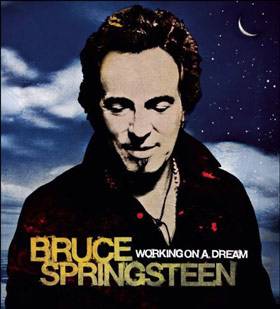
I love Bruce Springsteen. I await each of his releases with an eagerness that transcends most things musical, which says a lot for a music glutton like myself. In Springsteen’s music I find the gamut of fandom, from earnest quality to guilty pleasure. In recent years, I’ve been thrilled with the constancy of new Springsteen material, and even moreso with the quality of recent albums. But things are somehow different, now. Springsteen’s last two E-Street Band efforts, The Rising and Magic, as well as his Seeger Sessions record, now hearken to a time of struggle, a time of political angst for the recent past that proved why Bruce Springsteen is so successful: through rock ‘n’ roll he provides a voice to the voiceless, a song for those too downtrodden to sing. The ying and yang seen in the two formats of Springsteen’s playing, from the hopeful Seeger songs to his own songs of Americans who work hard and get little in return, balance nearly perfectly. While I’d be naïve to say, in any way, that Springsteen’s vision of struggle is over, for now this struggle is less apparent in the songs, and as a result the songs are far less interesting.
Simply put, Working on a Dream doesn’t offer much to be excited about. The title track works well as an Obama anthem, and continues to be inspiring even despite that victory; but the handful of sharp songs are outweighed by the seeming truckload of dull ones — songs such as “Outlaw Pete,” an attempt at folksong charm that tells a story that defies even the “absurd” moniker, and “Queen of the Supermarket,” the title of which plants in the hopeful listener the want to fling the “don’t judge a book by its cover” adage. Sadly, “Queen” is as ridiculous as its title, proving that clichés often stem from a form of truth. Further, Brendan O’Brien’s production is luke-warm here, opting for shimmery as opposed to subtle. Ultimately — though I don’t normally take potshots at the opinions of others — whoever was paid by Rolling Stone to compare this album to Born to Run and the Stones’ Exile on Main St. is overlooking the obvious ideas that, A) this album is in no way “classic,” and B) that if these elements are there in any way besides the fact that this is a rock record, they’re incredibly watered down.
Either way, this is a Springsteen album amidst an incredibly strong series of recent releases. I have little to complain about: in fact, the aforementioned three albums still feel fresh whenever I listen to them. Plus, Springsteen has always delivered an ugly duckling every now and then, one that can’t work through its troubles for listeners to receive the good. Perhaps, in several years, I’ll look back on Working on a Dream and discover amidst its hokey gleam whatever it is I’m missing right now, because I couldn’t take the album as a whole seriously enough to see it. After all, it was once hard to find much joy in the duo of Lucky Town/Human Touch, but they sound much better now than they did then. Same with Tunnel of Love. And Working is better than any of those, to the album’s credit. And if there’s one thing no one can deny of The Boss, it’s his ability to stand the test of time — or, perhaps, simply to be timeless. For now, though, I’ll consider Springsteen’s renaissance on hold.








